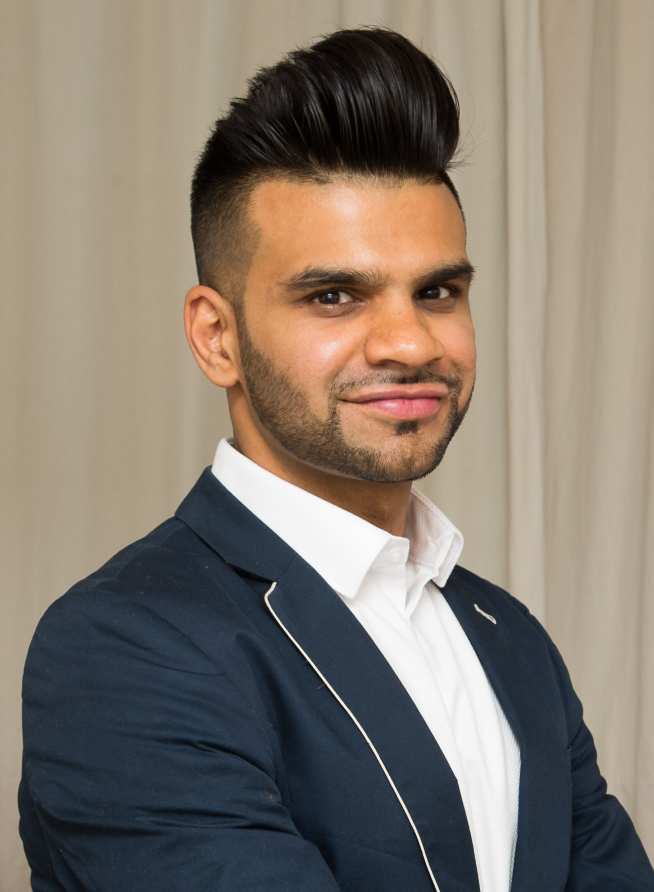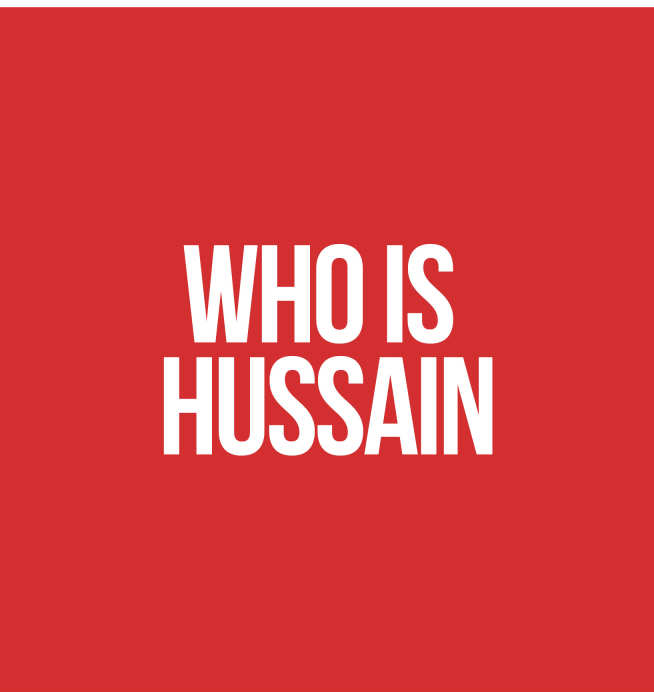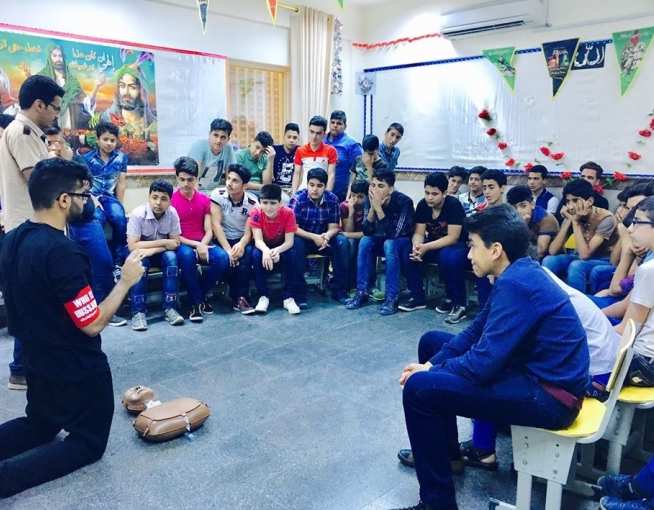
Mohammedabbas spends his time helping others, both directly as a GP and mentor and indirectly through the Who is Hussain Foundation, which he co-founded. He believes that to see a difference in the world you have to be that difference.
As he tells us: “I’ve always been someone who believes you need to walk the talk. I think it’s easy to talk about doing lots of things and very hard to do them, but that’s where the real value is.”
Medicine was an obvious calling for someone who so clearly wants to do good in the world. He explains that he chose to study at Imperial because he loved the energy at the university and felt it was a place where it was possible to make meaningful contributions if you wanted to.
But being a doctor wasn’t always Mohammedabbas’ ambition. “Once upon a time I was a really good football player. I loved it. I was even set to go on Fulham’s books,” he reveals.
However, his mum had other ideas about his future. She refused to sign the contract that Fulham offered Mohammedabbas as a teenager and instead encouraged him towards medicine; something that he admits, with hindsight, was probably the right decision.
“Ultimately, it was a decision about whether I take a risky career or apply for something where you can make a meaningful impact, which retrospectively I’m really happy about,” he says.
Both his parents have had a positive influence on the path his life has taken.
“My parents have always made me aware of the world around me and particularly of people who were less fortunate than me. They instilled this sense of duty to help people who are less fortunate however you can,” he explains.
A duty to give back
Mohammedabbas also names his parents as some of his most important mentors. “My mum and dad are hugely altruistic. My dad has volunteered a lot for charitable organisations, alongside his relief and entrepreneurial work. Someone who’s able to balance their professional and home life with their altruistic activities like that is a really good mentor to have,” he says warmly.
He recognises the importance of this kind of support, which is why he spends his time mentoring others, particularly newly qualified doctors and those in sixth form. He feels these transitional stages are when his support can be most beneficial.
“It’s really important to have someone in your corner who’s looking out for your interests, with no self-serving element to their support,” he says. “I’ve been quite lucky to have a number of roles and have worked in quite tough, underprivileged areas, often with high patient turnover and big catchments. I think being able to share that experience with junior doctors has been a real blessing.”
“You have to give back. I think that’s your role if someone has helped you,” he continues. At Imperial, he was helped by friends in the years above him during his studies, who gave him advice on how to apply for jobs or simply pointed out things to consider as he went through medical school.
“That was really helpful, because it’s really hard to work things out as you go along,” he comments.
Mentoring and coaching is something that Mohammedabbas intends to dedicate more time to in the future, because he’s found more people are seeking his advice and support.
A calling in medicine
Mohammedabbas works as a GP in London. In 2019, he was named as one of the 50 most influential GPs in the UK by PULSE, something he says took him by surprise. When asked why he chose to become a GP, he beams: “I loved it from day one.”
"I always loved the idea of working in a field where you could develop holistically, with the end goal of entering a vocation where all you ever do is anything you can to help other people. It’s such a lovely thing and I feel very lucky to have been able to do that."
Treating his patients is just one element of his work though. Mohammedabbas carries out a range of outreach with minority, and particularly Asian, communities.
There are a number of reasons he feels this is important, including that they’re one of the most high-risk groups for chronic diseases like diabetes, high blood pressure and heart disease.
Mohammedabbas is also the resident phone-in doctor for Sky channel Zee TV. Through this platform, he’s able to answer people’s questions, help them understand different medical issues and engage with different aspects of healthcare. One of the things he focuses on is preventative healthcare.
“Lifestyle is hugely important in these conditions, so reaching out to patients is really powerful and you can have a really big impact on a population who are at a high risk of such devastating illnesses,” he says.
A world of difference
Mohammedabbas also spends time volunteering overseas in crisis and catastrophe areas. It’s a field of medicine he developed a passion for while studying at Imperial.
“I went to Bosnia with Imperial College Aid to the Balkans (ICAB) and saw the impact of the ethnic cleansing and the wars that happened there. I was really affected and felt like I needed to make a difference, to be someone who stood for those who have nobody else to look out for them,” he states.
Since starting work, he’s used his annual leave to provide support in places including Iraq, Calais and Lesbos. But one thing he’s always found challenging is how to build longevity into this work. The goal, he explains, is to ensure people can still receive support when he’s left.
In Iraq, for instance, he focused on training local doctors and nurses to enable the polyclinics to run efficiently without the need for overseas medical staff.
I felt like I needed to make a difference, to be someone who stood for those who have nobody else to look out for them."
Dr Mohammedabbas Khaki
MBBS Medicine 2010
However, in some situations this kind of longevity has been more difficult to create than in others, such as the Rohingya refugee crisis. He explains that the scale of this crisis meant it was harder to see how he could add value, which led him to Doctors Worldwide. His experience in training medical staff was a natural fit with the charity and together they set up a Fellowship in Refugee Medicine.
To do this, Mohammedabbas went to work in the camps to assess their needs and gain an understanding of what training materials would be required to ensure all the doctors and healthcare professionals working there were providing the same level and standard of care.
He illustrates the importance of this work with an example of a female patient, who came to him with shortness of breath. Once he’d stabilised her, he found out she’d been waiting to see someone at the clinic for three hours.
“She could have died in that time,” he says. “But the point was, because they hadn’t been taught about triage and acute assessment, they didn’t prioritise her. This whole fellowship is about adding value and showing what we can do to prevent loss of life.”
If not me, then who? If not now, then when?

One concept that Mohammedabbas repeatedly mentions is that of having a positive impact on the world. It’s this desire to make things better and tackle social injustice that resulted in the Who is Hussain Foundation.
This is a charity that he co-founded with a group of friends in 2012. He explains that the idea all stemmed from the realisation that to see a change, they needed to be that change.
“The day we started it was odd. We had all had personal experiences of seeing terrible things happening in the world. We started asking ourselves why this was happening,” he explains.
As their conversation continued, they remembered Hussain, a seventh century revolutionary leader in the Muslim world who gave up everything, including his life, to fight against social injustice.
“We started asking, ‘Who are the Hussains of today?’ and then as we looked around we had the realisation that we had to be. It not us, then who? And if not now, then when?”
Initially they focused on the problem of homelessness, but momentum quickly grew. The Who is Hussain Foundation is now active on five continents, with over 90 teams working to combat all kinds of social injustice. “Our charity is doing unbelievable things,” he says with pride.
He tells us that, in 2019 alone, the team in Pakistan distributed over 30,000 meals and treated thousands of medical patients. In India, the charity has fed over 400,000 people in recent years. Closer to home, Who is Hussain holds weekly food drives in London and offers haircuts to homeless people.
Being the change

Mohammedabbas’ desire to tackle social injustice and to make a difference started long before he co-founded Who is Hussain.
He reveals that while he was studying for his final exams at Imperial, he set up the first-ever Imperial College Interfaith Society, after witnessing a racist incident.
“We got people from all the different faiths on board. Instead of getting angry or upset about what had happened, we turned it into positive action, which Imperial gave us the platform for. We created the Imperial College Action Network where we lived those positive messages and did charity work. It was amazing,” he enthuses.
When asked about the achievements he’s most proud of, he hesitates. “I think building things of substance that serve other people is my favourite thing,” he answers. “My mission is to create a positive, lasting impact on as many people as I can.”
Dr Mohammedabbas Khaki graduated with an MBBS in Medicine from Imperial College London in 2010. He was a winner of the Emerging Alumni Awards in 2020.
Emerging Alumni Leaders Award Winner
Dr Mohammedabbas Khaki is the recipient of our inaugural Emerging Alumni Leaders Award in 2020. This award recognises and celebrates alumni under the age of 40, who are remarkable leaders in their field, have demonstrated outstanding achievements or are making a substantial impact on society.